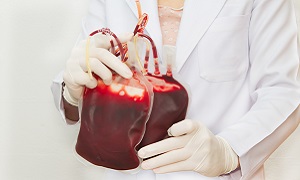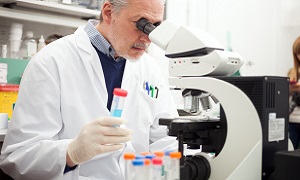Lymphoma
The cancer of the lymphatic system is called lymphoma. The lymphatic system comprises lymph nodes and vessels that are responsible for the movement of the lymphatic fluid throughout the body. White blood cells that fight the infections are present in the lymph fluid. The lymph nodes prevent the spread of infection. Lymphoma affects various parts of the body like bone marrow, lymph nodes, thymus gland, tonsils and spleen. Depending upon the type of lymphoma and the stage, the treatment for lymphoma varies. The cells of the lymphatic system are lymphocytes from where the lymphoma starts.
Types of Lymphoma
There are two main types of lymphoma. They are Hodgkin’s lymphoma and Non-Hodgkin’s lymphoma. Formerly, Hodgkin’s disease was the name used for Hodgkin’s lymphoma. The other types of lymphoma are:
- Chronic lymphocytic leukemia – It is a type of cancer that occurs in the bone marrow (the spongy tissue filling the inside of the bones) and blood.
- Cutaneous B-cell lymphoma – It is rare cancer that affects the skin. It begins in the B-cells, a type of white blood cells.
- Cutaneous T-cell lymphoma – This is rare cancer affecting the T-cells, a type of white blood cells. The T-cells are responsible for the germ-fighting mechanism of the immune system.
- Waldenstrom macroglobulinemia – The bone marrow produces abnormal white blood cells in large numbers in this rare cancer. The abnormal white blood cells impair the circulation that results in complications.
Causes of Lymphoma
When the lymphocytes (white blood cells) that fight diseases develop genetic mutation, the condition causes lymphoma. The cells multiply instantly due to the mutation that causes multiplying diseased lymphocytes. While the normal cells die, the diseased lymphocytes continue to live due to this genetic mutation. As a result, there are numerous diseased lymphocytes in the lymph nodes that cause swelling of the lymph nodes, spleen and liver.
This uncontrolled cell growth is largely responsible for causing lymphoma. People suffering from lymphoma have these diseased cells that continue to live and not die. However, it’s still unclear what actually causes lymphoma.
Symptoms of Lymphoma
In the early stage of this cancer, there are no symptoms. On physical examination by a doctor, you might come to know about the swelling in the lymph nodes. When there are small, soft nodules felt under the skin, it reveals that there is a swelling in the lymph nodes. One may feel the lymph nodes in the neck, armpit, upper chest, groin and stomach region.
There are various symptoms associated with lymphoma. The symptoms of lymphoma are not easy to detect and hence, the patient often learns about cancer in a later stage. These symptoms are:
- Unexplained weight loss
- Pain in the bones
- Painless swelling of the lymph nodes in various parts of the body
- Fever
- Cough
- Shortness of breath
- Itchy skin and rashes in the skin folds
- Stomach pain
- Pain during alcohol consumption
- Fatigue
- Night sweats
- Enlarged spleen
Diagnosis of Lymphoma
If the physical examination reveals symptoms of lymphoma, the doctor takes a biopsy for the diagnosis of cancer. For a biopsy, there is the removal of cells from the enlarged lymph nodes. A hematopathologist examines the cells to check for the lymphoma cells. If the lymphoma cells are present, the doctor also tells the type of cells. Upon finding the presence of lymphoma cells, the patient must undergo further testing to know the extent of the spread of these cells.
The various tests for lymphoma are blood testing, chest x-ray, testing of the lymph nodes and imaging scans like magnetic resonance imaging (MRI) or computed tomography (CT) that identify enlarged lymph nodes and additional tumors.
Physical Examination
Lymph node removal
Blood testing
Bone marrow sample for testing
Imaging scans
Treatment Options for Lymphoma
Regular monitoring

Radiation therapy
Chemotherapy

BMT

BMT requires high doses of chemotherapy and radiation. This suppresses the bone marrow. The doctor infuses the bone marrow cells from a healthy donor or healthy bone marrow cells from your body to rebuild bone marrow in your body.
Other treatment
Immunotherapy drugs kill the cancer cells while chimeric antigen receptor (CAR)-T cell therapy takes healthy T cells from your body and fights the cancer cells.







